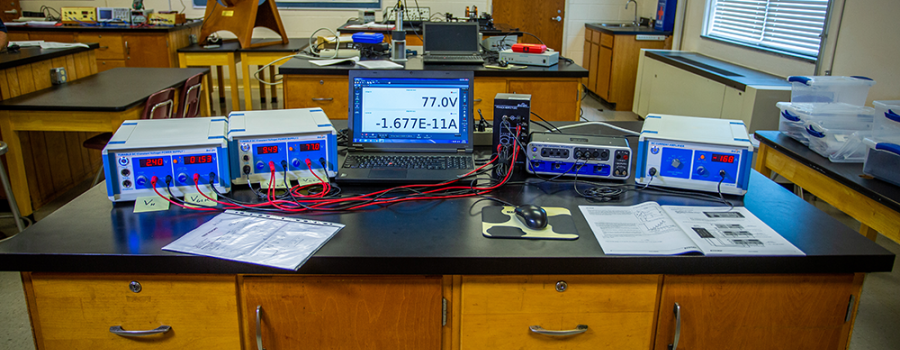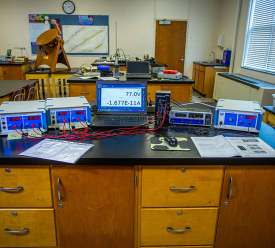Build a world you want to live in.
In the pre-engineering program at Cumberlands, you’ll build the foundation you need to succeed in engineering school and prepare for a career at the forefront of innovation. You'll cover programming, chemistry, mathematics, and physics, strengthening your skills in critical thinking, creative problem-solving, forethought, time management, and more. Completion of this degree program ensures that you will be well prepared for the engineering school of your choosing.
By the Numbers
Programs & Requirements
* The credit hours listed on this page only reference the specific program requirements and is not reflective of the total hours necessary to receive your degree. Cumberlands requires all students obtain a minimum of 60 hours for an associate’s degree and a total of 120 hours for a bachelor’s degree. Transfer and prior learning credits may be counted toward those totals.
To learn more about our General Education Requirements, please visit the page referenced below or explore our Academic Catalog.
Pre-Engineering Degree
If you want to be prepared for an engineering program, you need high-quality labs to work in and professors who are focused on your success. Our labs offer the equipment and space you need to practice your skills and test your math. Small class sizes will ensure that you get the individualized attention you need in class while you study complicated topics like classical physics, chemistry, calculus, and programming.
Course Requirements
- COMM 230 - Introduction to Public Speaking
- ENGL 131 - English Composition I
- ENGL 132 - English Composition II
- HIST 138 - World Civilization since 1648
- MUSC 130 - Music Appreciation Credits: 3 hours
- POLS 233 - American National Government
- THTR 130 - Introduction to Theatre
- SOCI 131 - Introduction to Sociology
- General Education required if not University of Kentucky Gen-Ed Certified.
*To receive a Bachelor of Arts, you will need to complete the required courses for a Bachelor of Science in addition to completing foreign language classes through the intermediate level.
- FREN 131 Elementary French I
- FREN 132 Elementary French II
- FREN 231 Intermediate French I
- FREN 232 Intermediate French II
- SPAN 131 Elementary Spanish I
- SPAN 132 Elementary Spanish II
- SPAN 231 Intermediate Spanish I
- SPAN 232 Intermediate Spanish II
3+2 Pre-Engineering Partnership
Students who plan to transfer to an engineering school can begin their studies by following the pre-engineering curriculum, which covers foundational coursework. The recommended curriculum may require adjustment, as requirements vary across institutions and engineering disciplines. Pre-engineering students are responsible for understanding the specific prerequisites of their intended transfer program. Students can typically complete the pre-engineering curriculum in two to three years, depending on pre-college preparation. Well-prepared students are encouraged to consider the dual-degree program outlined under the Applied Physics major. For those transferring to the University of Kentucky, completing the full UC general education curriculum qualifies students as UK Gen Ed Certified, allowing their credits to transfer as a block rather than being evaluated individually. Students intending to transfer without completing all of UC’s general education courses should consult the recommended options listed below.
If you want to pursue a dual-degree program, you should announce your Cumberlands major as “Applied Physics,” as that is the degree program which includes the courses that will lay the groundwork best for engineering school.
The 3+2, dual-degree program’s curriculum nominally requires three years at UC followed by two years at UK; however, a variety of situations may affect this timeframe. UC recommends that students complete introductory engineering courses during the summer between UC and UK. Many pre-engineering students are able to complete a bachelor’s degree from Cumberlands and engineering degree from UK in 5 years. Some engineering branches, however, require additional (and maybe extensive) background in programming, chemistry, or biology that are beyond the required curriculum, thus requiring more than five years of schooling to complete the desired engineering degree.
General Education Requirements: For students transferring to University of Kentucky through our 3+2 program, the entire UC general education curriculum should be completed in order to become UK Gen Ed Certified. Students who intend to transfer without completing all of UC’s general education can still be accepted into UK but will have to complete some general education requirements at UK in order to graduate.
Take the Next Step
Program Mission
University of the Cumberlands wants to provide you with a strong background in foundational engineering concepts – namely mathematics, physics, chemistry, and programming – so you are prepared to enter the engineering school of your choice.
Pre-Engineering Careers & Outcomes
All stats from U.S. Bureau of Labor Statistics
Civil engineers: $88,050
Civil engineers: $88,050
Plan, design, and supervise the construction and maintenance of building and infrastructure projects.
Electrical engineers: $101,780
Electrical engineers: $101,780
Design, develop, test, and supervise the manufacture of electrical equipment.
Materials engineers: $98,300
Materials engineers: $98,300
Develop, process, test materials that are going to be used to create a wide range of products.
Mining engineers: $97,090
Mining engineers: $97,090
Design mines to safely and efficiently remove minerals that will be used for manufacturing and utilities.
Agricultural Engineers: $82,640
Agricultural Engineers: $82,640
Solve problems involving power supplies, machine efficiency, the use of structures and facilities, pollution and environmental issues, and process as well as store agricultural products.
Industrial Engineers: $95, 300
Industrial Engineers: $95, 300
You would devise efficient systems that integrate workers, machines, materials, information, and energy to make a product or provide a service.
Common Questions
A pre-engineering degree is a foundational program designed to prepare students for further studies in engineering. It focuses on core subjects such as mathematics, physics, chemistry, and programming, equipping students with essential skills needed for success in an engineering degree program.
A pre-engineering degree typically takes two years to complete if pursued as an associate degree. However, many students continue their education in a four-year engineering program afterward, making the total time for earning an engineering degree approximately four to six years.
Some universities may offer components of a pre-engineering degree online, but it often includes in-person labs and hands-on experiences that are crucial for understanding engineering principles. It's essential to check with specific institutions for available online options.
In short, there is a formal agreement between Cumberlands and the University of Kentucky (UK) to ensure that students who want to pursue careers as engineers have a seamless pathway from a pre-engineering degree at Cumberlands into an engineering degree program at UK. It’s dubbed our “3+2 program” because it requires 3 years’ worth of education from Cumberlands followed by 2 years’ worth from UK. In the end, you have two bachelor’s degrees: an applied physics degree from UC, and an engineering degree from UK. For more details about the program, contact the Office of Academic Affairs.
Yes, a pre-engineering degree can be worth it for those interested in pursuing a career in engineering. It provides the necessary foundational knowledge and skills required for advanced studies in engineering, potentially leading to lucrative career opportunities.
With a pre-engineering degree, graduates can pursue further studies in various engineering disciplines, such as civil, electrical, or materials engineering. While a pre-engineering degree alone may not qualify for specific engineering jobs, it prepares students to transfer to a bachelor's program in engineering.
To obtain a pre-engineering degree, you can enroll in a community college or university that offers this program. Complete the required coursework in mathematics, physics, chemistry, and programming, and maintain the necessary academic standing to transfer into an engineering program.
The field of pre-engineering encompasses foundational concepts and skills related to engineering. It includes subjects such as applied mathematics, physics, and chemistry, emphasizing critical thinking, problem-solving, and analytical skills that are essential for success in various engineering fields.
Faculty Experts in Pre-Engineering
Learn more about the pre-engineering professors you will interact with.

Amy Bowman

Debbie Pierce

Kenny Siler
Kenny Siler
Contact Information
Request Information
Let us know if you have any questions!

